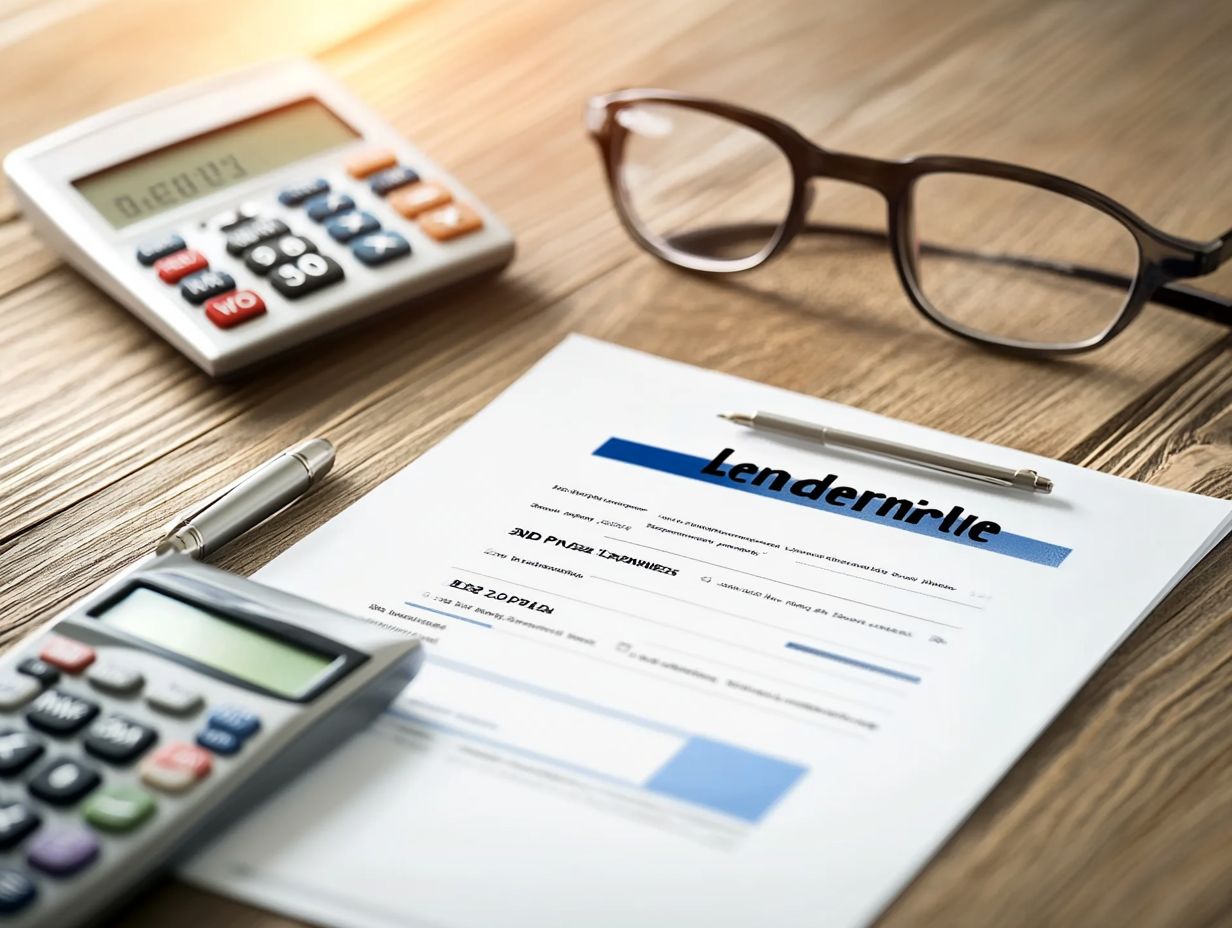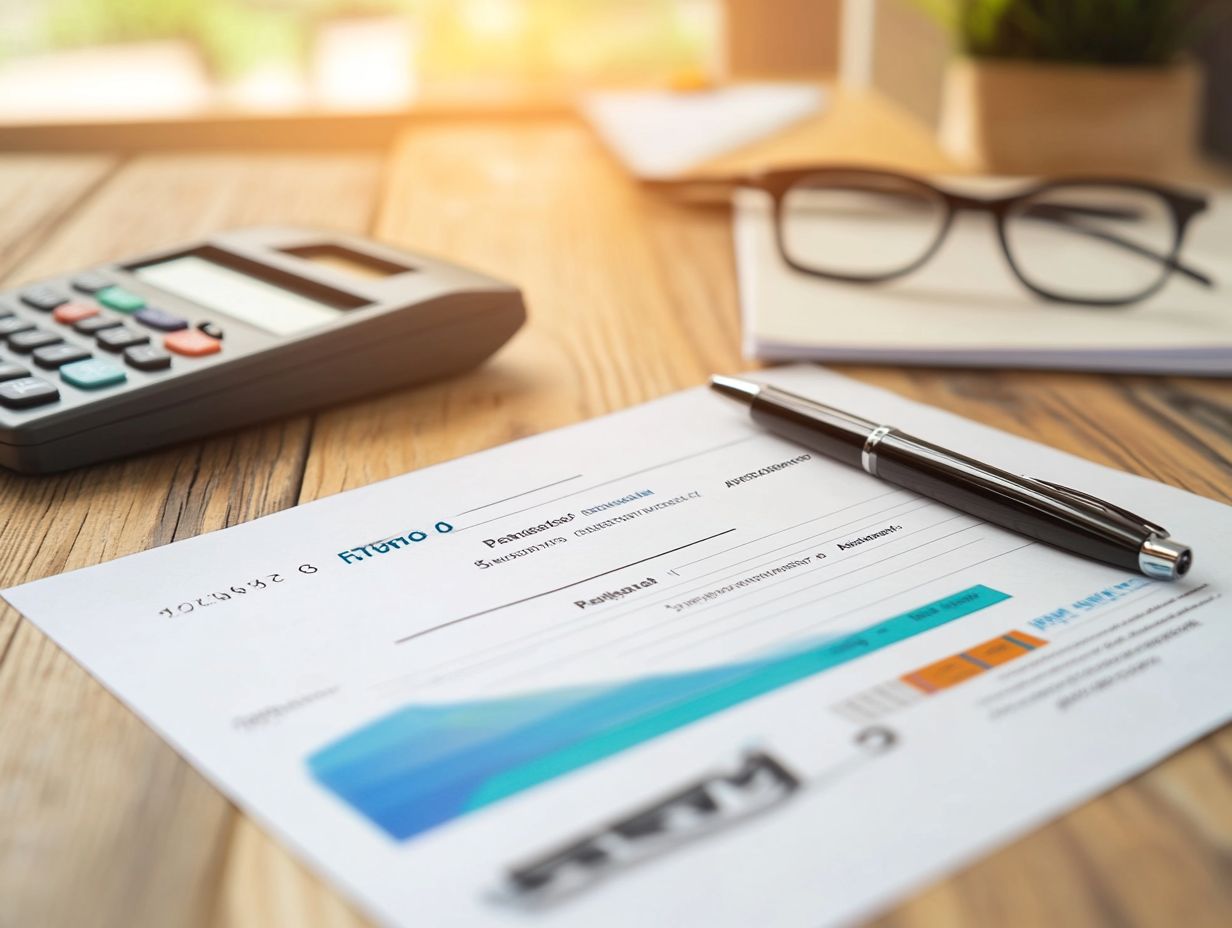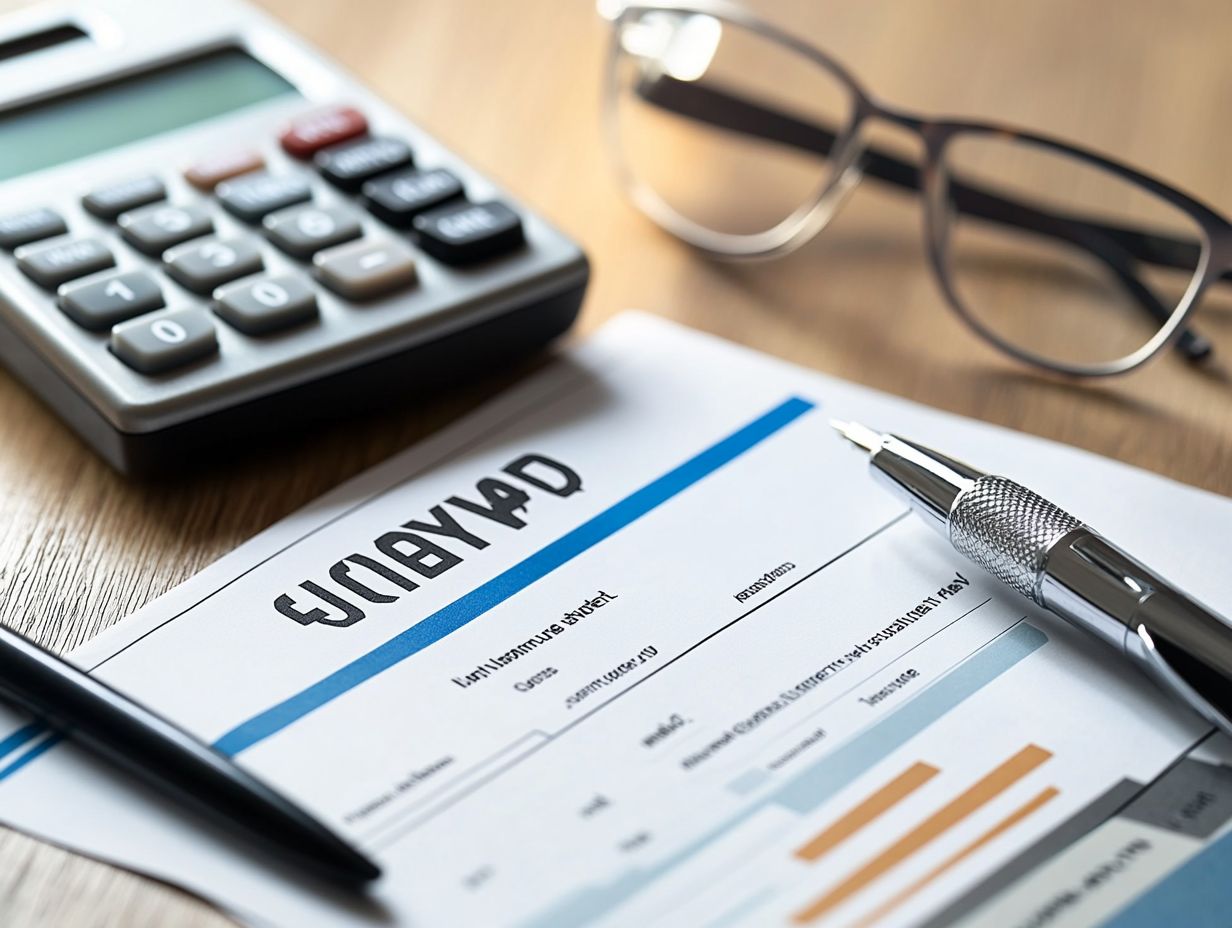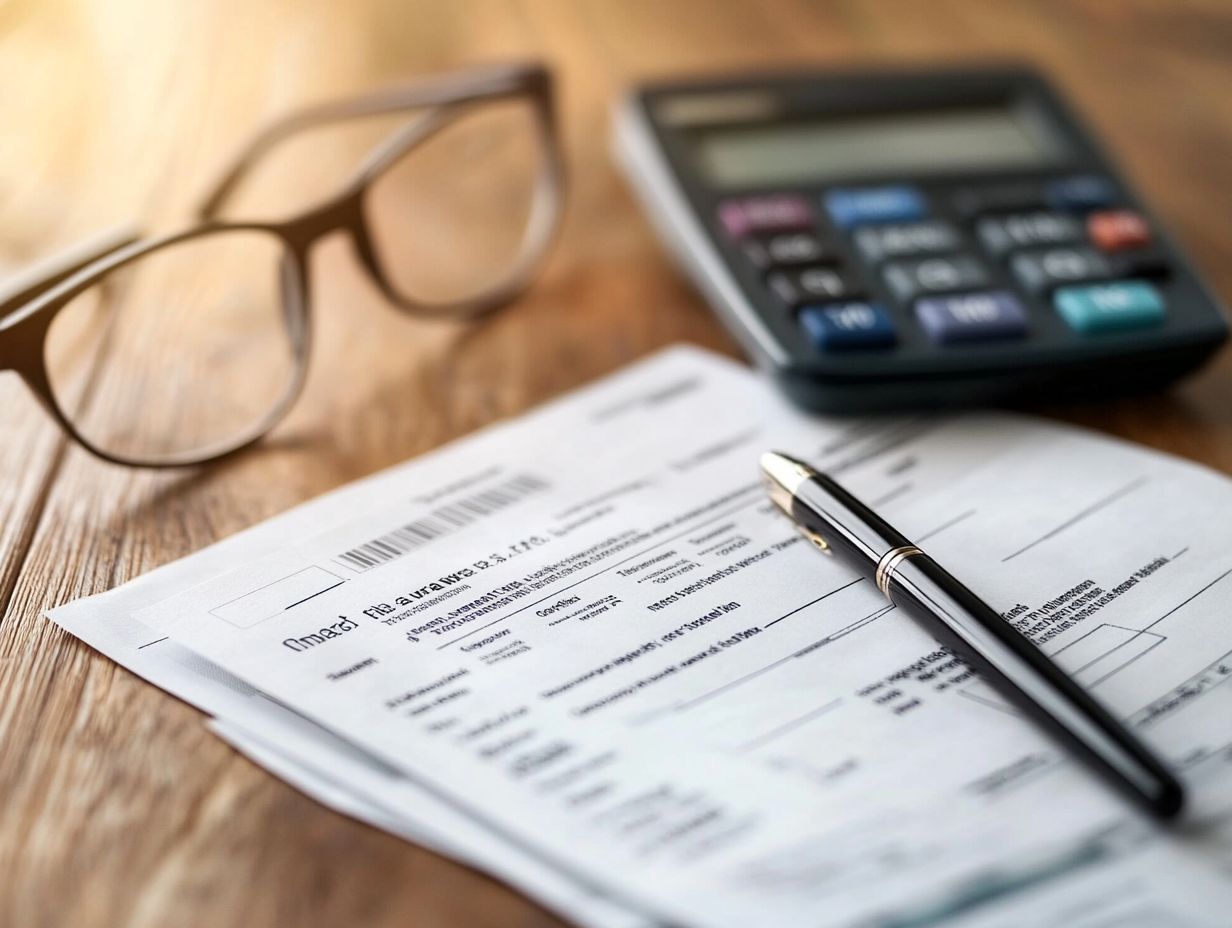The Impact of Late Payments on Your Credit Score
Understanding your credit score is crucial for your financial health. Many people underestimate how late payments can impact it deeply.
This article delves into the concept of a credit score and the various factors that contribute to its calculation. It emphasizes the significance of making timely payments and outlines the consequences of falling behind, which may include fees and penalties that can weigh heavily on your finances.
You ll also find practical strategies to avoid late payments, along with tips for recovering your credit score.
Stay engaged to discover how you can protect and enhance your financial future.
Contents
- Key Takeaways:
- Understanding Credit Scores
- The Importance of Timely Payments
- Consequences of Late Payments
- Strategies for Avoiding Late Payments
- Creating a Budget and Payment Plan
- Recovering from Late Payments
- Improving Your Credit Score
- Negotiating with Creditors
- Frequently Asked Questions
- Can I remove late payments from my credit report?
- What can I do to avoid late payments?
Key Takeaways:

Understanding Credit Scores
Understanding credit scores is crucial for anyone navigating the credit landscape. These numerical representations of your credit reliability can profoundly influence your financial opportunities, including loan approvals, interest rates, and rental agreements.
Credit scores, typically calculated by credit bureaus such as Experian, Equifax, and TransUnion, are derived from various factors including payment history and how much of your available credit you are using. A healthy credit score generally reflects a pattern of on-time payments and responsible management of credit accounts.
What is a Credit Score and How is it Calculated?
A credit score serves as a numerical snapshot of your credit reliability, calculated using various factors from your credit report. Creditors rely on this score to assess borrowing risks.
The calculation primarily hinges on several critical elements, with payment history taking center stage. This aspect, which reflects how timely you are with your payments on loans or credit cards, carries significant weight constituting about 35% of your overall score.
Another essential factor is credit utilization, which measures how much of your available credit you are currently using. To maintain a favorable score, it’s generally advisable to keep this ratio below 30%.
Different credit bureaus like Experian, Equifax, and TransUnion may utilize distinct methodologies, resulting in slight variations in your final credit scores. By understanding these factors, you can take charge of your financial health and enhance your prospects for securing favorable lending terms.
The Importance of Timely Payments
Timely payments are essential for sustaining a robust credit score and a positive payment history. They act as a shield against negative marks that could jeopardize your overall credit reliability and financial well-being.
By consistently meeting payment due dates, you minimize the risk of late payments, which can trigger higher interest rates and penalties from creditors. Keeping a strong record of on-time payments protects your credit score and elevates your standing with lenders, paving the way for more favorable financial opportunities.
How Late Payments Affect Your Credit Score
Late payments can profoundly affect your credit score, as they re reported to credit bureaus like Experian, Equifax, and TransUnion, which meticulously track your payment history and assign negative marks accordingly.
When you miss a payment, credit bureaus typically document this on your report, and you might see a dip in your score within just a few weeks. The longer you delay whether it s 30, 60, or even 90 days the more damaging the consequences become. This can lead to hefty penalties, such as higher interest rates on your existing loans or credit cards.
A single late payment can haunt your report for up to seven years, creating a ripple effect that not only tarnishes your payment history but also complicates your chances of securing favorable financing terms in the future.
Consequences of Late Payments

The consequences of late payments can be substantial. They extend beyond immediate penalties like late fees. Long-term repercussions include a lowered credit score and potential charge-offs, which are debts that creditors write off as uncollectible. These can mar your credit history for years.
It s crucial to stay proactive in managing your payments to safeguard your financial future.
Additional Fees and Penalties
Late payments can lead to additional fees and penalties. Overdue accounts may incur late fees and increased penalty APRs, which can significantly impact your money situation and credit score.
For example, a creditor may impose a $25 late fee for your first missed payment. If the account remains overdue, that fee could double with each subsequent late payment.
Over time, these charges can create substantial financial strain and may lead to higher interest rates. Make it a habit to check your billing statements, as they provide a clear outline of any fees imposed.
Understanding how creditors operate can offer valuable insights, enabling you to navigate and mitigate these financial pitfalls effectively.
Negative Impact on Credit History
The consequences of late payments on your credit history can linger far longer than expected. Credit bureaus diligently document late entries, including the specific delinquency date. These entries can haunt your credit report for several years.
This impact typically lasts up to seven years. Such blemishes can significantly drag down your credit score throughout that period. Recognizing this is vital for your financial health. Each late payment not only chips away at your score but also affects the terms of any future loans or credit extensions.
Lenders scrutinize credit reports for signs of delinquency, placing considerable weight on payment history when assessing creditworthiness. Therefore, cultivating timely payments and maintaining a pristine record is essential for long-term financial stability.
Strategies for Avoiding Late Payments
Act now to secure your financial future! Developing effective strategies to avoid late payments is essential for protecting your credit score and overall money situation. Consider options like:
- setting up automatic payments,
- crafting a detailed budget,
- formulating a clear payment plan that aligns with your unique financial situation.
By taking these proactive steps, you can ensure timely payments and maintain a strong financial foundation.
Setting Up Automatic Payments
Setting up automatic payments can be a smart move to ensure your bills are paid on time. Financial institutions can withdraw payments directly on the due date, minimizing the risk of late fees.
This convenience not only saves you time but also protects your credit score. To get started, provide your bank account information or card details to your service providers for a seamless transaction process.
However, keep an eye on payment reminders to avoid potential overdraft fees or unintentional missed payments. Regularly monitoring your accounts is crucial to prevent situations where a high bill could throw your budget off course.
Creating a Budget and Payment Plan

Creating a budget and payment plan is essential for anyone navigating financial hardship. It enables you to manage your expenses more effectively and ensures that you meet your minimum payments on time.
By establishing a realistic budget, you can prioritize your essential expenses. This allows you to explore repayment options that comfortably fit within your financial landscape. Laying out a clear strategy for spending and saving helps you pinpoint areas where you might cut back or allocate funds more efficiently.
Tracking your income against your expenses is vital; it helps you maintain a disciplined approach to your finances. Setting up automatic payments for your minimum obligations significantly reduces the risk of late fees, which can complicate your financial situation.
Embracing these practices not only enhances your responsible money management but also cultivates peace of mind during challenging times.
Recovering from Late Payments
Recovering from late payments is crucial for maintaining a strong credit score. This can be accomplished through vigilant credit monitoring, thoughtful adjustments to your payment strategies, and meticulous financial planning.
Improving Your Credit Score
Improving your credit score after experiencing late payments requires a focused strategy on enhancing your payment history. Leverage credit monitoring tools to track your progress and receive timely alerts.
By consistently making on-time payments, you can significantly elevate your credit rating over time. It s wise to set up reminders or automate your payments to ensure that bills are settled promptly.
Responsible credit utilization the amount of credit you use compared to your credit limit is equally crucial. Aim to keep your balances below 30% of your credit limits to showcase your financial discipline.
Regularly reviewing your credit reports for inaccuracies can help uncover errors that might negatively impact your scores. Subscribing to credit monitoring services provides real-time updates, allowing you to stay informed and take proactive steps in managing your credit health effectively.
Negotiating with Creditors
Negotiating with creditors opens up valuable options for you, such as crafting a more manageable payment plan or exploring debt recovery solutions that can ease your financial burden.
Establishing open lines of communication is crucial in this journey. This allows you to candidly express your financial situation and inquire about potential adjustments to your existing terms.
Understanding the various options available like refinancing or temporarily reducing payments enables you to make informed decisions tailored to your needs. You may be surprised to learn that creditors often welcome dialogue, especially when they see a sincere effort on your part to address the situation.
By actively engaging in discussions and showcasing your commitment to repayment, you can often negotiate terms that offer relief while paving the way toward a more stable financial future. Take the first step and reach out to your creditors today!
Frequently Asked Questions
How do late payments affect my credit score?

Late payments can have a significant negative impact on your credit score. They can lower your score by up to 100 points, making it harder for you to get approved for loans and credit cards in the future. To learn more about this, check out our guide on understanding the impact of debt on credit scores.
What qualifies as a late payment?
A late payment is any payment made after the due date. This includes payments made a few days, weeks, or even months after the due date.
Will one late payment ruin my credit score?
One late payment may not have a significant impact on your credit score, but it can still lower it by a few points. The more late payments you have, the more it will affect your score.
How long do late payments stay on my credit report?
Late payments can stay on your credit report for up to 7 years. This can have a long-term effect on your credit score and make it harder for you to get approved for credit in the future.
Can I remove late payments from my credit report?
You might be able to remove a late payment from your credit report by arguing against it with the credit reporting agency. If the late payment is accurate, it will remain on your report.
What can I do to avoid late payments?
Stay organized and keep track of your due dates! Setting up automatic payments or reminders can help you pay on time.






